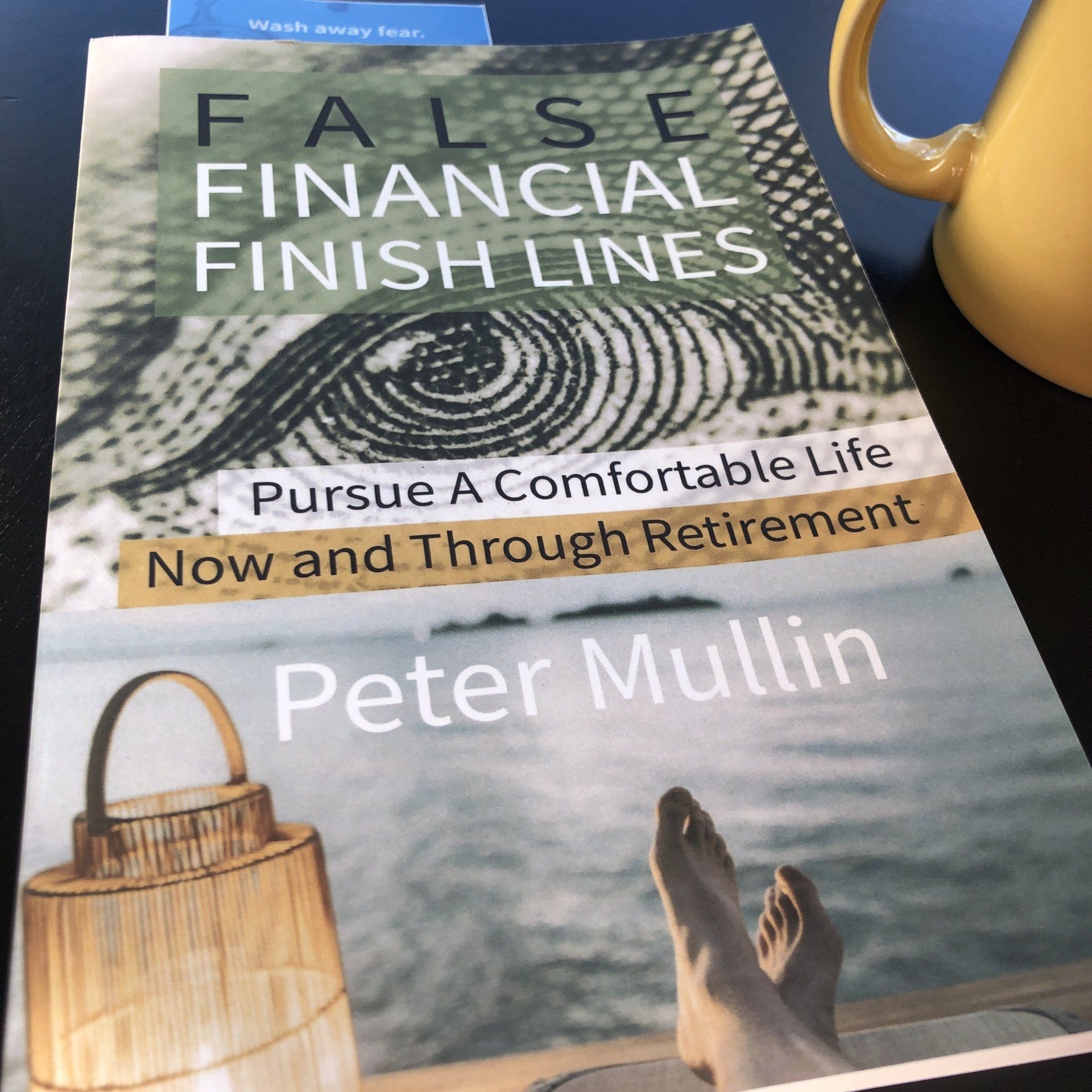6 Common Post-Retirement Mistakes

Retirement should be a time of relaxation and living a worry-free lifestyle. But that is not the reality for many older Americans whose retirement years turn into nancial nightmares. Even if you think that you made all the right moves before your retirement, don't assume that you are in the clear. Avoid turning
your golden years into a struggle to survive by avoiding these six typical mistakes retirees make when it comes to their nances.
To receive your 44-page sample Peter Mullin's book False Financial Finish Lines,Pursuing a Comfortable Life Now and Through Retirement, just go to our website. Minimal info is required to get your download now.
Six Post-Retirement Money Mistakes
1. Maintaining your same lifestyle. You shouldn't be forced to live a life of deprivation after retiring, but most people won't be able to stick to the same level of spending they had when they were still bringing home a paycheck. Think about cutting back on those little expenses like eating out or spending money on entertainment. That is not necessarily a bad thing. More free time gives you the chance to learn to cook and concentrate on long put-off hobbies.
2. Refusing to downsize. This goes hand-in-hand with wanting to maintain the same lifestyle after retirement. Retirement might be the perfect time to sell your larger home and move into something smaller and more manageable. Perhaps even an apartment or condo. Not only will it relieve you of a costly mortgage and home maintenance, but any extra equity in your home will provide a cushion of cash for you.
3. Applying for Social Security too early. Try not to claim your Social Security benets as soon as they become available. If you take your benets as early as possible, you are leaving a lot of potential money on the table. Those who are lucky enough to have substantial retirement savings or another source of income may nd it benecial to hold off until your benets reach their maximum level.
4. Spending a large chunk of money too soon. It is terribly tempting to nally buy that RV or boat you had your eye on for years now that you have the time to use it, but it probably isn't a smart idea. It is much wiser to wait and see how you adjust to retirement for a few months or even longer before spending your nest egg and reducing your ability to earn interest on that money for years to come.
5. Keeping your current investments. Your investment portfolio performed well, so why is your retirement the ideal time to take another look at it? Since you won't be generating new income from work, you will need to rely on your investments to see you through. That means you want to invest in generally more conservative investment products. Sitting down with your money manager can really help you make smart post-retirement investments.
6. Making mistakes when it comes to taxes. Many new retirees fail to take advantage of methods when it comes to paying taxes. Taxes are complex, and it is easy to make the wrong tax move which can end up costing you a lot of money. It is always a good idea to consult with a professional money manager who can help guide you through your options.
Do you want even more advice on the best way to maintain your financial life after retirement? The sooner you talk with your financial advisor, the better.
###
The opinions voiced in this material are for general information only and are not intended to provide specic advice or recommendations for any individual.
No strategy assures success or protects against loss.
The information provided is not intended to be a substitute for specic individualized tax planning or legal advice. We suggest that you consult with a qualied tax or legal advisor.
Investing involves risk including loss of principal.
There is no guarantee that a diversied portfolio will enhance overall returns or outperform a non- diversied portfolio. Diversication does not protect against market risk.
This content is developed from sources believed to be providing accurate information, and provided by Twenty Over Ten. It may not be used for the purpose of avoiding any federal tax penalties. Please consult legal or tax professionals for specic information regarding your individual situation. The opinions expressed and material provided are for general information, and should not be considered a solicitation for the purchase or sale of any security.
- Mullin's take on the "4% Retirement Rule"
- Navigate "Bad Portfolio Weather"
- Tips to Optimize Social Security





Articles and Assets
What are your Priorities?
Well it’s the end of the year. I just searched on Google for “market outlook 2018.” I came up with a little over 58-million “results.”
So should you be investing in stocks in 2018? The quick answer: It’s likely a prudent part of your portfolio. But it depends on your circumstances, right?
It’s apparently popular to throw your hat in the ring.
A mantra that you hear among disciplined professionals is to “stay the course.”
Then you hear “sell high, buy low.”
Who’s right?
The relief of a disciplined strategy is that it can be tailored to you. And tailor we think you should.
Yes, it’s possible that an investor may not utilize stocks in their portfolio at all. Or you may decide to go “all in” with a diversified stock portfolio.
(Side effects from tailoring a strategy may include increased confidence & persistence, apathy toward daily market reports, and increased focus on what really matters.)
Let’s begin with the “Why” of investing for you. Then you can request 15-minutes on the phone discuss your “how.”
So “Why Should You Invest”
Life changes and our “why” of investing ought to transform with life. Some invest for sport – they like the risk/reward of investing – they’re in it for the thrill. I don’t hang with this crowd.
Most of us ought to invest for things we want. Our money & our goals are serious. By investing in a diversified portfolio we can pursue things we want.
1. Living A Comfortable Retirement: Retirement is a noun. It’s up to you to really design and live a retirement that reflects you.
2. Purchasing a Home: Home is a place to live. It can take a down payment.
3. Passing an Inheritance on to Family:
4. Student Loan Shield: This idea is important for many Millennial graduates. Student loans can dominate your budget. But instead of accelerating those payments, what if you paid your required payments, and then invested the additional money that you were going to pay against your loan balance?
5. Emergency Reserves: You probably have read that it’s prudent to keep a relative healthy amount of cash in your checking/savings. Once you’ve achieved that, then you can consider investing additional funds. Go a step further and consider a non-retirement account for you and your house. You can spend this on cars, vacations or use it just as described in #4.
The Dow Jones has seen positive results, so far, in 2017. It’s unusual and sort of uncomfortable as the independent financial advisor. Why is it uncomfortable?
What would sting & linger longer? Finding $20 in the parking lot? Or finding a $20 parking fine on your windshield?
We’ve been finding a lot of metaphorical “$20’s” (i.e. “positive results”) in our portfolios this year. So the second we find a parking fine (or a few in a row) we’ll be sure to ask if stocks are still the right place to park our money.
Complacency can work against us, Dear Clients. Just keep recalling your long-haul strategy and your “why” of investing.
***
Peter Mullin is an independent financial advisor registered through LPL Financial. He lives in Rogers, MN with his family. He was born and raised in St. Cloud, MN. Mullin Wealth Management is located in Waite Park, MN.
The opinions voiced in this material are for general information only and are not intended to provide specific advice or recommendations for any individual.
Investing involves risk including loss of principal.
There is no guarantee that a diversified portfolio will enhance overall returns or outperform a non-diversified portfolio. Diversification does not protect against market risk.
All performance referenced is historical and is no guarantee of future results.
All indices are unmanaged and may not be invested into directly. No strategy assures success or protects against loss.









